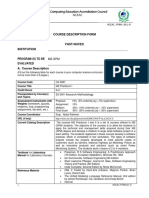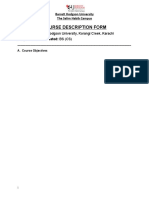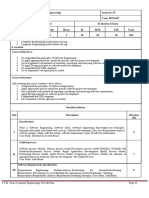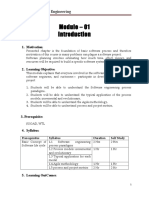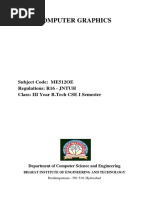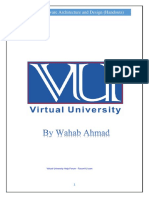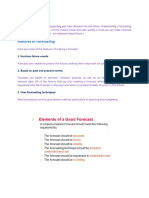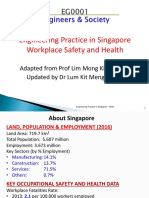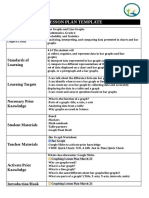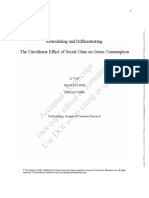0 ratings0% found this document useful (0 votes)
17 viewsCovered Student Outcome Development of Engineering Solution (B) Engineering Design (C) Modern Tools Utilization (E)
Covered Student Outcome Development of Engineering Solution (B) Engineering Design (C) Modern Tools Utilization (E)
Uploaded by
shela malaThis course provides an introduction to software engineering. It is a required 3-credit course that meets for 150 minutes per week. The course aims to teach students about software engineering concepts like analysis, project management, and scheduling. Topics covered include the software development lifecycle, modeling, design principles, project management, and quality assurance. Students will learn modeling with UML, lifecycle approaches, working in teams, and applying problem solving to project management. Their learning will be assessed through midterm and final exams, as well as questionnaires.
Copyright:
© All Rights Reserved
Available Formats
Download as PDF, TXT or read online from Scribd
Covered Student Outcome Development of Engineering Solution (B) Engineering Design (C) Modern Tools Utilization (E)
Covered Student Outcome Development of Engineering Solution (B) Engineering Design (C) Modern Tools Utilization (E)
Uploaded by
shela mala0 ratings0% found this document useful (0 votes)
17 views2 pagesThis course provides an introduction to software engineering. It is a required 3-credit course that meets for 150 minutes per week. The course aims to teach students about software engineering concepts like analysis, project management, and scheduling. Topics covered include the software development lifecycle, modeling, design principles, project management, and quality assurance. Students will learn modeling with UML, lifecycle approaches, working in teams, and applying problem solving to project management. Their learning will be assessed through midterm and final exams, as well as questionnaires.
Original Title
es-tkit162208-rekayasa-perangkat-lunak-2018
Copyright
© © All Rights Reserved
Available Formats
PDF, TXT or read online from Scribd
Share this document
Did you find this document useful?
Is this content inappropriate?
This course provides an introduction to software engineering. It is a required 3-credit course that meets for 150 minutes per week. The course aims to teach students about software engineering concepts like analysis, project management, and scheduling. Topics covered include the software development lifecycle, modeling, design principles, project management, and quality assurance. Students will learn modeling with UML, lifecycle approaches, working in teams, and applying problem solving to project management. Their learning will be assessed through midterm and final exams, as well as questionnaires.
Copyright:
© All Rights Reserved
Available Formats
Download as PDF, TXT or read online from Scribd
Download as pdf or txt
0 ratings0% found this document useful (0 votes)
17 views2 pagesCovered Student Outcome Development of Engineering Solution (B) Engineering Design (C) Modern Tools Utilization (E)
Covered Student Outcome Development of Engineering Solution (B) Engineering Design (C) Modern Tools Utilization (E)
Uploaded by
shela malaThis course provides an introduction to software engineering. It is a required 3-credit course that meets for 150 minutes per week. The course aims to teach students about software engineering concepts like analysis, project management, and scheduling. Topics covered include the software development lifecycle, modeling, design principles, project management, and quality assurance. Students will learn modeling with UML, lifecycle approaches, working in teams, and applying problem solving to project management. Their learning will be assessed through midterm and final exams, as well as questionnaires.
Copyright:
© All Rights Reserved
Available Formats
Download as PDF, TXT or read online from Scribd
Download as pdf or txt
You are on page 1of 2
Course Code TKIT162208
Course Name Software Engineering
Course Instructors Selo; Indriana Hidayah; Adhistya Erna Permanasari
Course Type Required
Course Classification Engineering Topics
Credit / Contact Hour per Week 3 /150 minutes per Week
Course Description This course aimed to introduce students on various knowledge
and technique regarding software engineering. Furthermore,
students are expected to understand several concept to
analyse software, project management, and scheduling.
Prerequisites Courses
Covered Student Outcome Development of Engineering Solution (b)
Engineering Design (c)
Modern Tools Utilization (e)
Learning Outcome
Study Program
Student Outcome
No Learning Outcome SO (a) – SO (k)
1. Student will be able to model the structure and behavior a Development of
software system the UML class diagrams and state Engineering Solution
diagrams. (b)
2. Student understand common lifecycle processes including Development of
waterfall (linear), incremental approaches (such as Unified Engineering Solution
process), and agile approaches. (b)
3. Students can work collaboratively in a small team Engineering Design
environment to develop a moderate-sized software system (c)
from conceptualization to completion, including
requirements elicitation, system modeling, system design,
implementation, unit and system testing, integration,
source code management.
4. Students is able to apply critical analysis, problem solving, Modern Tools
and team facilitation skills to software engineering project Utilization (e)
management processes using real-world scenarios.
5. Students is able to describe the principal tasks of software Engineering Design
project managers, and basic concepts in software projects. (c)
6. Students is able to plan software projects, including risk Engineering Design
and quality management. (c)
Topic a. Product, role evolution and software characteristics
b. Process in software engineering
- Supporting processes, methods and tools in SE
- Various process models in SE
- Product and process in SE
c. Modeling and Principles in concept analysis
d. Modeling analysis
e. Principles and design concepts
f. Object-oriented Software Engineering
g. The concept of project management
- Human Resource Management
- Problem management
- Product and process management
h. Software process and project metrics
i. Planning a software project
j. Risk Management
k. Project Scheduling
Software Quality Assurance
Direct Asessment
Direct Asessment Plan Measured Learning Outcome
Mid Exam LO1, LO2
Final Exam LO3, LO4
Indirect Assesment Questionnaire and direct communication
References 1. Pressman, R.S., Software Engineering A Practitioner’s Approach
9th, ed, McGraw-Hill International Edition, New York, 2015.
2. Sommerville, I., Software Engineering (9th Edition), Addison
Wesley, 2011.
You might also like
- Software Process and Project Management PDFDocument3 pagesSoftware Process and Project Management PDFMa AshrafNo ratings yet
- Notes Unit 1Document17 pagesNotes Unit 1Viyan SinghNo ratings yet
- Se SyllabusDocument2 pagesSe SyllabusSubh AryanNo ratings yet
- SE - Lesson PlanDocument5 pagesSE - Lesson Planabhaymallik94No ratings yet
- Unit 1 (Oosad) - Part OneDocument49 pagesUnit 1 (Oosad) - Part OneTsegazeab ZinabuNo ratings yet
- 4ITRC3Document2 pages4ITRC3Kunal BangNo ratings yet
- Software Engg Course Handout 2024 Qver0.5-1Document5 pagesSoftware Engg Course Handout 2024 Qver0.5-1shubhuannu25No ratings yet
- Is3139 CisDocument2 pagesIs3139 CisFernando DarmawanNo ratings yet
- Software Design and ArchitectureDocument2 pagesSoftware Design and ArchitectureFaseeh SultanNo ratings yet
- OOSE Course ContentDocument2 pagesOOSE Course ContentDinesh ReddyNo ratings yet
- 01.MSPracticumFall2021CourseDescription EngrAbdulRahmanDocument3 pages01.MSPracticumFall2021CourseDescription EngrAbdulRahmanMahmoodAbdul-RahmanNo ratings yet
- SE41Document40 pagesSE41Debraj ChatterjeeNo ratings yet
- Semester: IV Subject Name: Software Engineering Subject Code: 09CE0402Document8 pagesSemester: IV Subject Name: Software Engineering Subject Code: 09CE0402aNo ratings yet
- Sadp Lab Manual PDFDocument38 pagesSadp Lab Manual PDFVasavi VasuNo ratings yet
- SE NotesDocument65 pagesSE Notesvvvcxzzz3754No ratings yet
- Unit 1 Introduction To Software EngineeringDocument25 pagesUnit 1 Introduction To Software EngineeringRavi RavalNo ratings yet
- Advance Software Engineering NotesDocument188 pagesAdvance Software Engineering NotesKosaksi PasapugazhNo ratings yet
- SoftwareDevelopmentLifecycles (SDLCS)Document118 pagesSoftwareDevelopmentLifecycles (SDLCS)estisagita0310No ratings yet
- Course Description Form: Barrett Hodgson University The Salim Habib CampusDocument10 pagesCourse Description Form: Barrett Hodgson University The Salim Habib CampusSheeraz ArifNo ratings yet
- Software Engineering SyllabusDocument2 pagesSoftware Engineering Syllabusprathamesh.kulkarni22No ratings yet
- Software Engineering Lab Manual For GUDocument47 pagesSoftware Engineering Lab Manual For GUABCNo ratings yet
- IT 301 Software Architecture and Design Patterns PDFDocument2 pagesIT 301 Software Architecture and Design Patterns PDFAshwin MohanNo ratings yet
- Software EngineeringDocument3 pagesSoftware EngineeringImtiyaz BashaNo ratings yet
- Syllabus: Subject: Software EngineeringDocument4 pagesSyllabus: Subject: Software EngineeringTuyên Kiều VănNo ratings yet
- Software Project ManagDocument23 pagesSoftware Project ManagDeepak GourNo ratings yet
- Swe2004 Software-Architecture-And-Design Eth 1.0 47 Swe2004Document2 pagesSwe2004 Software-Architecture-And-Design Eth 1.0 47 Swe2004ANUHYA REDDYNo ratings yet
- Sinhgad Institute of Technology & Science, PuneDocument15 pagesSinhgad Institute of Technology & Science, PuneSmita BhosaleNo ratings yet
- OOPSDocument64 pagesOOPSSunil AmrutamNo ratings yet
- Course Syllabus Course DetailDocument2 pagesCourse Syllabus Course DetailMeron SolomonNo ratings yet
- Software Engineering Theory SyllabusDocument3 pagesSoftware Engineering Theory SyllabusComputer Science & Engg, PusadNo ratings yet
- Software Engineering FundamentalsDocument76 pagesSoftware Engineering FundamentalsRidoy KothaNo ratings yet
- Materi Perkuliahan Pertemuan 01 - 080317Document47 pagesMateri Perkuliahan Pertemuan 01 - 080317Pahlevi RidwanNo ratings yet
- 01.MSPracticumIISpring2022CourseDescription EngrAbdulRahman v2Document3 pages01.MSPracticumIISpring2022CourseDescription EngrAbdulRahman v2MahmoodAbdul-RahmanNo ratings yet
- Agile Software DevDocument142 pagesAgile Software DevKeshav BansalNo ratings yet
- Module - 01: Software EngineeringDocument145 pagesModule - 01: Software EngineeringAyush TiwariNo ratings yet
- 1 Outline SE F2021Document6 pages1 Outline SE F2021Abdullah JuttNo ratings yet
- Software Engineering: Dr. Saba Khalil ToorDocument34 pagesSoftware Engineering: Dr. Saba Khalil ToorHaseebb AsifNo ratings yet
- AB - Advanced Software Engineering Fall 2023-2024 - SpecDocument6 pagesAB - Advanced Software Engineering Fall 2023-2024 - Speczaidjayousi99No ratings yet
- Course Outline Software ArchitectureDocument3 pagesCourse Outline Software ArchitectureahmedNo ratings yet
- Software Engg - Chapter1-1Document20 pagesSoftware Engg - Chapter1-1Saloni PatilNo ratings yet
- SPM Syllabus 2024Document4 pagesSPM Syllabus 2024SIT 147- Mhatre HardikNo ratings yet
- Computer Graphics (Me512oe)Document20 pagesComputer Graphics (Me512oe)shavi rajput 〰No ratings yet
- CS 200SEB Software EngineeringDocument5 pagesCS 200SEB Software EngineeringnarradoNo ratings yet
- 2024 MC4102 Oose Unit 1 KVL NotesDocument22 pages2024 MC4102 Oose Unit 1 KVL Notesvijayalakshmi krishnamoorthyNo ratings yet
- Master Course Computational Engineering VGU-P04: Modern Programming Concepts in EngineeringDocument2 pagesMaster Course Computational Engineering VGU-P04: Modern Programming Concepts in EngineeringthaoNo ratings yet
- Qec SeDocument2 pagesQec SefastfurqanNo ratings yet
- UT Dallas Syllabus For cs3354.501 05f Taught by Hieu Vu (hdv013000)Document3 pagesUT Dallas Syllabus For cs3354.501 05f Taught by Hieu Vu (hdv013000)UT Dallas Provost's Technology GroupNo ratings yet
- Master Degree in Computing at Univ. Roehampton, UKDocument4 pagesMaster Degree in Computing at Univ. Roehampton, UKMimyNo ratings yet
- Software-Engineering unit 1 imp (1)Document50 pagesSoftware-Engineering unit 1 imp (1)2022cs0333No ratings yet
- LEC-2 (SE) - SW-ProcessDocument29 pagesLEC-2 (SE) - SW-ProcessSubhan AmjadNo ratings yet
- CS603 Software Architecture and Design HandoutsDocument123 pagesCS603 Software Architecture and Design HandoutsMr Jenni33% (3)
- Why Teach Reverse EngineeringDocument4 pagesWhy Teach Reverse EngineeringMauricio CVNo ratings yet
- Exam 1 Study Guide - CEN6016Document2 pagesExam 1 Study Guide - CEN6016Salman KhanNo ratings yet
- Software Design and Architecture SWE-501Document2 pagesSoftware Design and Architecture SWE-501Faseeh SultanNo ratings yet
- Learning Software Engineering PrinciplesDocument6 pagesLearning Software Engineering PrinciplesGábor ImolaiNo ratings yet
- SE ReportDocument43 pagesSE ReportKen Adams100% (1)
- NewSyllabus 10120148176317Document3 pagesNewSyllabus 10120148176317Pritam KumarNo ratings yet
- APSC 171 Syllabus 2020-1WDocument10 pagesAPSC 171 Syllabus 2020-1Wthilakunkili15No ratings yet
- SEfinalDocument21 pagesSEfinalshap121815No ratings yet
- 7986 14002 1 PBDocument9 pages7986 14002 1 PBshela malaNo ratings yet
- Susunan Kepengurusan GMD MalangDocument1 pageSusunan Kepengurusan GMD Malangshela malaNo ratings yet
- 6.21, 7.3, 7.4 - 103046Document3 pages6.21, 7.3, 7.4 - 103046shela malaNo ratings yet
- Hasil Rekap TOS3 LEVEL 2Document7 pagesHasil Rekap TOS3 LEVEL 2shela malaNo ratings yet
- IF184952 Digital Image ProcessingDocument3 pagesIF184952 Digital Image Processingshela malaNo ratings yet
- Tambunan, Menyonsong 25 Tahun Sister City Jakarta - TokyoDocument12 pagesTambunan, Menyonsong 25 Tahun Sister City Jakarta - Tokyoshela malaNo ratings yet
- Bahasa Inggris 7 Tahun SBMPTNDocument23 pagesBahasa Inggris 7 Tahun SBMPTNshela malaNo ratings yet
- Satuan Acara Pengajaran: - PengajarDocument1 pageSatuan Acara Pengajaran: - Pengajarshela malaNo ratings yet
- Anthropometrics and ErgonomicsDocument2 pagesAnthropometrics and ErgonomicsANGELIKA ORTEGANo ratings yet
- Nnamdi Azikiwe University 2019/2020 Merit Admission Cut Off MarksDocument2 pagesNnamdi Azikiwe University 2019/2020 Merit Admission Cut Off MarksDivine WilfredNo ratings yet
- Week 3-Biz Ethics-2Oct23Document22 pagesWeek 3-Biz Ethics-2Oct23Shahruk AnwarNo ratings yet
- Chapter 3, ForecastingDocument5 pagesChapter 3, ForecastingMd Fahim Muntasir HeavenNo ratings yet
- Workplace Safety and Health EthicsDocument68 pagesWorkplace Safety and Health EthicssitalNo ratings yet
- BL1013 - Bioscience in Practice - Module Handbook 19-20 2Document15 pagesBL1013 - Bioscience in Practice - Module Handbook 19-20 2tmxqgk5cd4No ratings yet
- 合并PDFDocument3 pages合并PDFBozhaoNo ratings yet
- .2 G2-EtptDocument44 pages.2 G2-EtptELIZABETH GRACE AMADORNo ratings yet
- Unit 2.1 Explain Why It Is Important To Take A Balanced Approach To Risk ManagementDocument3 pagesUnit 2.1 Explain Why It Is Important To Take A Balanced Approach To Risk ManagementfegasinnovationsNo ratings yet
- ICT As Platform For ChangeDocument27 pagesICT As Platform For ChangeRJNo ratings yet
- HMR Discussion 2-Liao Kar SuiDocument2 pagesHMR Discussion 2-Liao Kar SuiyusharnidaNo ratings yet
- MCR3U1 Course OutlineDocument2 pagesMCR3U1 Course Outlinedamifan2015No ratings yet
- Introduction CH 1 To Information Management Settingthe Scene 2007Document10 pagesIntroduction CH 1 To Information Management Settingthe Scene 2007Mohit KhatwaniNo ratings yet
- Tema18 1Document2 pagesTema18 1Ana HuayhuaNo ratings yet
- Garner March 23 Lesson PlanDocument4 pagesGarner March 23 Lesson Planapi-612420884No ratings yet
- STI Course 2 Learning JournalDocument7 pagesSTI Course 2 Learning JournalIRISH ANNE MARAMAGNo ratings yet
- GPP Chapter 1Document33 pagesGPP Chapter 1Nashat ZakirNo ratings yet
- Fabric Defect Classification Using Transfer Learning and Deep LearningDocument8 pagesFabric Defect Classification Using Transfer Learning and Deep LearningIAES IJAINo ratings yet
- An Introduction To Mixed Method Research: January 2006Document5 pagesAn Introduction To Mixed Method Research: January 2006ayramirezNo ratings yet
- 9 Relationship of CRP With Other Professions Lecture No 8Document11 pages9 Relationship of CRP With Other Professions Lecture No 8Saadat LarikNo ratings yet
- MCRJSIVol12No.12021 HabizahPP04 257 268Document13 pagesMCRJSIVol12No.12021 HabizahPP04 257 268bhagyasww1No ratings yet
- For Review Only: Assimilating and Differentiating: The Curvilinear Effect of Social Class On Green ConsumptionDocument71 pagesFor Review Only: Assimilating and Differentiating: The Curvilinear Effect of Social Class On Green ConsumptionRemaNo ratings yet
- B.Tech. in Computer Science and Engineering With Specialization in Information Technology / B.Tech in Information TechnologyDocument4 pagesB.Tech. in Computer Science and Engineering With Specialization in Information Technology / B.Tech in Information TechnologyAbishekNo ratings yet
- Mathematics 4 CotDocument5 pagesMathematics 4 Cotangelica.hermoginoNo ratings yet
- Qualitative Data AnalysisDocument27 pagesQualitative Data Analysism66pf8zrywNo ratings yet
- English #2Document2 pagesEnglish #2CLARKNo ratings yet
- Types of EvaluationsDocument4 pagesTypes of EvaluationsMahamoudou TouréNo ratings yet
- Unit 2 Culminating Assignment - What Kind of Career Is Right For MeDocument3 pagesUnit 2 Culminating Assignment - What Kind of Career Is Right For MeSydney PabbiesNo ratings yet
- Learners' Perception Towards Project-Based Learning inDocument24 pagesLearners' Perception Towards Project-Based Learning inEuge ArebaloNo ratings yet
- Form Three Midterm Results - September 2024Document3 pagesForm Three Midterm Results - September 2024catherinekaria6No ratings yet










